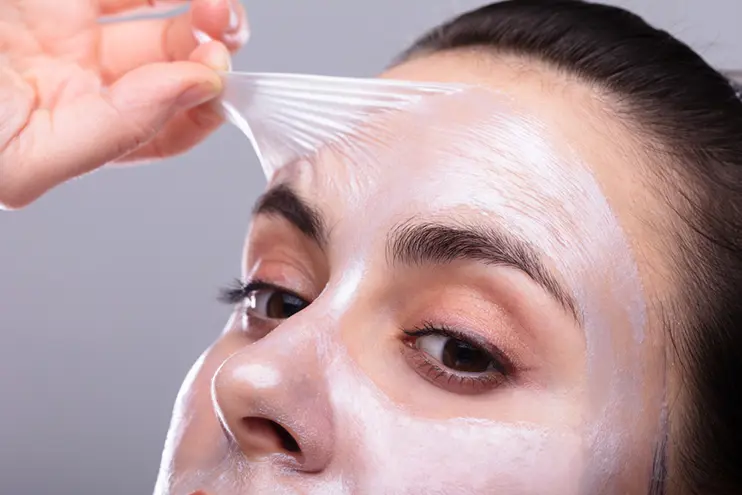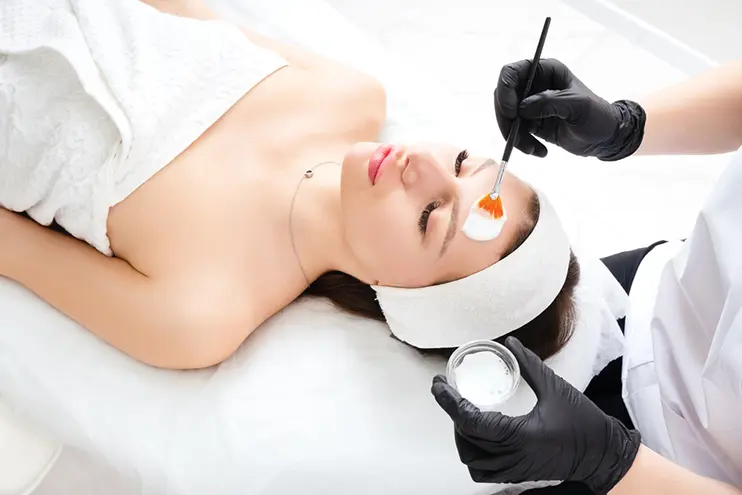Chemical Peels
- Home
- Chemical Peels
Our Doctor

Dr. Rahul Sheshgiri
Dermatologist & Cosmetic Doctor
Chemical Peels

Introduction
Chemical peels have long been a staple in skincare routines, offering a versatile solution for a wide range of skin concerns, from acne and hyperpigmentation to fine lines and dullness. This non-invasive treatment involves the application of a chemical solution to the skin, which exfoliates the outermost layers, stimulates collagen production, and promotes cell turnover, resulting in smoother, more youthful-looking skin. In this comprehensive guide, we’ll explore the benefits of chemical peels, the different types available, what to expect during treatment, and how to incorporate them into your skincare regimen for optimal results.
Understanding Chemical Peels
A chemical peel is a cosmetic procedure that uses a chemical solution to exfoliate and rejuvenate the skin. The solution is typically composed of one or more acids, such as alpha hydroxy acids (AHAs), beta hydroxy acids (BHAs), or trichloroacetic acid (TCA), which work to remove dead skin cells, unclog pores, and improve skin texture and tone.
Chemical peels can be tailored to address specific skin concerns and are available in various strengths, ranging from superficial to deep. Superficial peels are milder and target the outermost layer of the skin, while medium and deep peels penetrate deeper into the skin to address more significant issues such as wrinkles, acne scars, and sun damage.
Benefits of Chemical Peels

Improved Skin Texture: Chemical peels exfoliate the skin, removing dead skin cells and promoting cell turnover, which results in smoother, softer skin texture. This can help minimize the appearance of fine lines, wrinkles, and rough patches, leaving the skin looking fresh and rejuvenated.
Reduced Hyperpigmentation: Chemical peels can help lighten and even out skin tone by targeting hyperpigmentation, such as sun spots, age spots, and melasma. The exfoliating action of the peel helps fade dark spots and reveal a more uniform complexion.
Acne Treatment: Chemical peels are an effective treatment option for acne-prone skin, as they help unclog pores, reduce oil production, and exfoliate the skin’s surface. This can help prevent breakouts and minimize the appearance of acne scars over time.
Stimulated Collagen Production: Chemical peels stimulate collagen production in the skin, which helps improve skin elasticity and firmness. This can result in a more youthful appearance and a reduction in the signs of aging, such as sagging skin and fine lines.
Enhanced Radiance: By removing dull, dead skin cells and promoting cell turnover, chemical peels can help reveal brighter, more radiant skin. This can give the complexion a healthy glow and improve overall skin luminosity.
Types of Chemical Peels
Alpha Hydroxy Acids (AHAs): AHAs, such as glycolic acid and lactic acid, are commonly used in superficial peels to exfoliate the outermost layer of the skin. These peels are gentle and well-tolerated, making them suitable for all skin types.
Beta Hydroxy Acids (BHAs): BHAs, such as salicylic acid, are oil-soluble acids that penetrate deep into the pores to unclog them and reduce acne breakouts. BHAs are often used in peels for acne-prone or oily skin.
Trichloroacetic Acid (TCA): TCA peels are medium-depth peels that penetrate deeper into the skin to target fine lines, wrinkles, and sun damage. These peels are more aggressive and may require downtime for recovery.
What to Expect During a Chemical Peel?
Before undergoing a chemical peel, it’s essential to schedule a consultation with a qualified skincare professional to assess your skin type, concerns, and treatment goals. During the procedure, the skin will be thoroughly cleansed and prepped before the chemical solution is applied evenly to the treatment area.
Depending on the type and strength of the peel, you may experience a tingling or burning sensation as the solution is applied. This sensation usually subsides after a few minutes. After the peel is removed, the skin may appear red or irritated, similar to a sunburn, and may peel or flake in the days following treatment.
Conclusion

Chemical peels offer a versatile and effective solution for a variety of skin concerns, from acne and hyperpigmentation to aging and dullness. By exfoliating the skin, stimulating collagen production, and promoting cell turnover, chemical peels can reveal smoother, brighter, and more youthful-looking skin. If you’re considering a chemical peel to rejuvenate your complexion and address specific skin concerns, consult with a qualified skincare professional to determine the best treatment plan for your needs. With regular chemical peel treatments and a comprehensive skincare regimen, you can achieve radiant, healthy-looking skin that glows from within.
What People Says!
Hear from our delighted clients as they share their experiences and stories of transformation. Your trust inspires us to keep delivering excellence!



